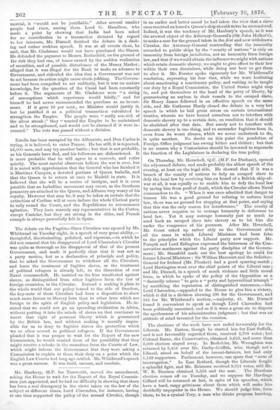The debate on the Fugitive-Slave Circulars was opened by Mr.
Whitbread on Tuesday night, in a speech of very great ability,— thoughtful, discriminating, polished, and vigorous,—in which he did not conceal that his disapproval of Lord Clarendon's Circular was quite as thorough as his disapproval of that of the present Government, and made it perfectly clear that it was not as a party motion, but as a declaration of principle and policy, that he asked the Government to withdraw all the Circulars, and leave the treatment of fugitive slaves, as the treatment of political refugees is already left, to the discretion of our Naval commandefk. He insisted on the bias manifested against slaves, as distinguished from other fugitives from the law of foreign countries, in the Circular. Instead o making it plain to the whole world that our policy leaned to the side of freedom, the key-note of these Circulars had been a disposition to show much more favour to Slavery laws than to other laws which are foreign to the spirit of English policy and legislation. He in- sisted that we could not go on spreading civilisation in Africa, without putting it into the minds of slaves on that continent to assert that right of personal liberty which is guaranteed by the British law, and without making it morally impos- sible for us to deny to fugitive slaves the protection which we so often accord to political refugees. If the Government pleaded that it was proper to wait for the Report of the new Commission, he would remind them of the possibility that they might receive a rebuke in the meantime from the Courts of Law, which might inform the Government that they were asking a Commission to explain to them their duty on a point which the English Law Courts had long ago settled. Mr. Whitbread's speech was a great success. It was lucid, earnest, and resolute.


































 Previous page
Previous page